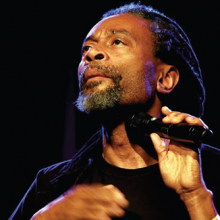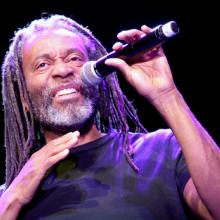bobby mcferrin
This year I have been trying something new to me. I’m trying my hands at a little music or concert review. It’s a chance to experiment with this nascent methodology I’m developing. The posts have been some of the most commented upon on Facebook and even on the blog. Thanks for everyone’s engagement!
Though not the beginning, certainly the central review is this duo about Mumford and Sons and eschatological banjos. Cathleen Falsani was in town and we had a great time at these shows. These concerts are all about the eschaton, transcendence, immanence, and banjos. There are always banjos. I know.
IN THE PAST 150 years, the songs historically known as “Negro spirituals” have worn many costumes. They emerged, of course, from the Deep South during the days of slavery, when songs such as “Every Time I Feel the Spirit” or “Wade in the Water” were first sung by anonymous psalmists wielding hoes or pulling cotton sacks. Since that time they’ve been dressed in the style of the European art song, sung as grand opera, or even faithfully mimicked by well-meaning white folk singers.
The spirituals entered the mainstream of American culture through the performances of the Fisk Jubilee Singers from Fisk University in Nashville who, fresh out of slavery themselves, toured the North in the 1870s. In the 1950s and ’60s, the old standards were resurrected, and slightly rewritten, as marching songs for the African-American freedom movement and then echoed across the world as anthems for human rights from South Africa to Northern Ireland to Eastern Europe.
After all that, the spirituals can probably even survive being remade into “smooth jazz,” which is more or less what happens to them on Bobby McFerrin’s new album Spirityouall. Readers of a certain age might remember McFerrin as the guy who, in 1988, conquered the known pop music universe with an airheaded ditty called “Don’t Worry, Be Happy.” The tune was so infectious that it should have had a warning label from the Centers for Disease Control, but instead it dominated radio, won some Grammys, and, to McFerrin’s eternal horror, was used as theme music by the George H.W. Bush presidential campaign.
He’s best known for his iconic 1980s feel-good hit “Don’t Worry, Be Happy,” but Grammy-award winning artist Bobby McFerrin explores a deeper side of life in a new album.
Titled spirityouall, the recording includes his adaptations of traditional African-American spirituals and devotional songs that he composed.
McFerrin believes music has a transcendent spiritual power.


